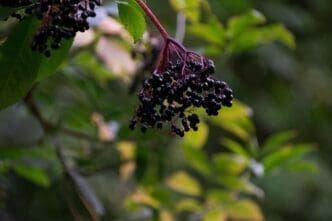Many Americans have been turning to elderberry supplements, spending a whopping $175 million last year on pills, syrups, and powders. But do these products stand up to their claimed benefits? This has been a topic of widespread interest and speculation.
Elderberries, with their rich purple hue, are famous for being packed with antioxidants and vitamins. They’ve been a part of traditional medicine across several continents for ages. However, the big question remains: do they really help fend off colds and flu effectively? Let’s dive into the details.
Elderberries: A Traditional Remedy
Elderberries have been associated with health benefits for centuries. Found in various regions around the world, they are reputed for their antioxidant properties. Many people believe these berries can help with colds and the flu. Despite their popularity, scientific consensus is still pending on their actual effectiveness.
The Boom After COVID-19
Since the pandemic, the elderberry market has exploded. Products promising to boost immune health sold rapidly, tapping into widespread health anxieties. Yet, the Food and Drug Administration (FDA) has not confirmed these claims, leading to ongoing debates.
Experts emphasize that while elderberries show potential, more research is needed to substantiate their benefits. Dr. Matthew Badgett from the Cleveland Clinic finds them promising for cold and flu symptoms but is cautious. He states elderberries aren’t a ‘game changer.’
Promising Studies, Few Confirmations
Some studies highlight elderberries reducing flu symptoms, notably cutting down recovery days. One trial illustrated a four-day reduction in flu duration, a significant shift from the usual seven-day expectancy. However, these results are not definitive.
Dr. Badgett mentions that while the results are remarkable, they need larger studies for confirmation. The focus remains on whether elderberries can prevent illness onset, an unanswered question in the scientific community.
He points out that much research comes from industry-funded sources, often showing positive results. This bias should be considered when evaluating effectiveness.
Prevention of flu and colds with elderberries is not well-researched. Dr. Badgett explains that the viral load is high once symptoms appear, complicating prevention efforts. The concept of using elderberry supplements daily as protection remains speculative.
Safety Concerns and Recommendations
Elderberry supplements are considered safe in commercial products, but there’s a catch: consuming them raw or unripe can be harmful. Such berries contain cyanide-producing substances, leading to nausea and more severe symptoms.
Dr. Kirstyn Hill advises thorough cooking of elderberries to neutralize toxins. She reassures that commercial products are generally safe as they avoid raw ingredients. Still, it’s wise to select independently-tested brands to ensure safety.
The sheer variety of elderberry products can be overwhelming for consumers. Dr. Badgett highlights the complexity in choosing among diverse formulations, which may cause confusion. Comparing these products is akin to differentiating apples from oranges.
Supplements vs. Traditional Prevention Methods
Experts suggest that elderberry supplements cannot replace basic health practices. Hand-washing, vaccinations, and a balanced lifestyle remain crucial. Dr. Kori Flower emphasizes maintaining hygiene and pursuing vaccinations for effective prevention.
Nutrition and exercise are pivotal in overall health, potentially surpassing supplements. Elderberries might offer supplementary benefits but shouldn’t be relied on solely. They are part of a broader health strategy, rather than a standalone solution.
Potential Benefits: Worth the Investment?
The million-dollar question: are elderberries worth the $175 million spent last year? While they offer potential advantages, their proven effectiveness is still under research. Spending wisely involves understanding what’s backed by science versus commercial interests.
For those considering elderberry supplements, weighing existing evidence is key. Recognize the industry bias and seek products verified by independent bodies. This cautious approach ensures informed consumer decisions.
The Elderberry Market’s Future
Given the current pace of research, the future of elderberries in the supplement market is uncertain. With growing consumer interest, continuous investigations are likely to unfold, potentially unveiling new insights.
Further studies may validate some elderberry benefits, potentially solidifying their place in mainstream health supplements. Until then, consumers must navigate the market with a discerning eye.
Elderberries, in whatever form, will likely stay a popular topic. The combination of traditional use and modern intrigue keeps them relevant in health discussions.
Summing Up the Elderberry Debate
Elderberries carry a mixed bag of beliefs and facts. Dr. Badgett’s observations highlight their potential yet cautiously note their limitations. They aren’t magic bullets for cold and flu prevention, yet they might offer some advantages.
In weighing elderberry’s medicinal promise, consumers must stay informed and skeptical. The tendency for industry-funded studies to show favorable results should be considered, ensuring decisions are based on balanced information.
Elderberry supplements are here to stay, but their actual impact is still unfolding. As more studies emerge, we may soon understand how these berries fit into our health landscape.







